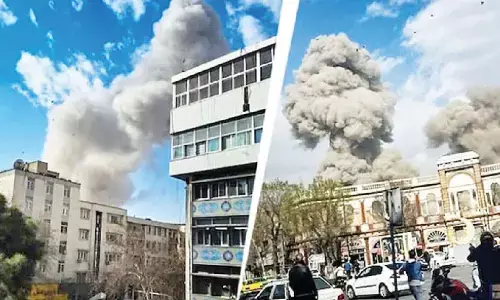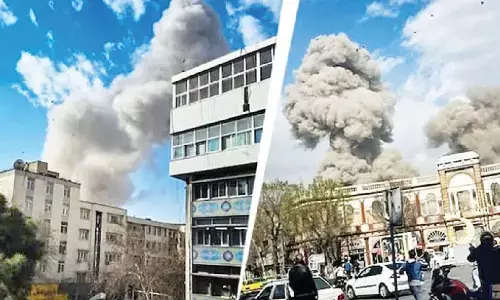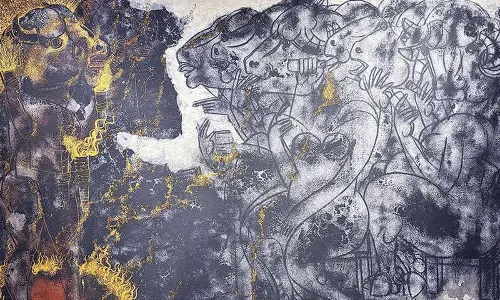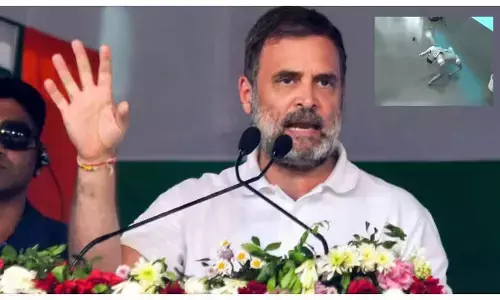The clash of Begums

The Clash of Begums, Parliamentary Elections, Fight Against Fundamentalists. The worse fallout has been the birth of fundamentalism. It has been increasing because of the poisonous speeches the maulvis and the mullahs make after the Friday prayers
The worse fallout has been the birth of fundamentalism. It has been increasing because of the poisonous speeches the maulvis and the mullahs make after the Friday prayers. It goes to the credit of Sheikh Hasina that she has kept the fight against fundamentalists on top of her agenda and has harked back on the days of secularism which the rule by Sheikh Mujibur Rahman had ushered in
WITHIN a few minutes of my arrival at Dhaka, I was in the midst of a debate whether the parliamentary elections, to be held on January 5, 2014, would be fair and independent. Prime Minister Sheikh Hasina has constituted an all-party interim government and has even offered Begum Khalida Zia, who is her main opponent and heads the Bangladesh Nationalist Party (BNP) to join. But Sheikh Hasina is “the problem” with Begum Khalida.
I can say after my five-day stay in Bangladesh that the polls would be fair if Khalida Zia boycotts them which look very much on the cards. Sheikh Hasina does not want to step down and looks like going to any extent to retain power. She amended the State’s Constitution which provided for a caretaker government, headed by the outgoing retired Supreme Court Chief Justice, to supervise the polls.
What amazes me is the alacrity with which Sheikh Hasina has frittered away her four-fifths of majority in parliament. Her mis-governance has increased corruption, contaminating even the government functionaries in villages. Begum Khalida has aggravated the situation by organizing hartal every third day, hitting the common man. Sheikh Hasina too had organized hartals when she was in the wilderness.
The two Begums, becoming prime minister alternatively, have talked to each other on the phone probably for the first time. There is no breakthrough, not even via the conciliators, because of personal hostility. There is enough evidence to support the suspicion that Begum Khalida’s close associates were behind the attack on Sheikh Hasina’s meeting when she was out of power. The Jammat-e-Islami is the biggest gainer. Methodically and relentlessly, it has created cells in all segments of the society, including the intelligentsia. The Jammat has the advantage of BNP’s dependence on it. The two were together in the government which Begum Khalida headed. They would be the coalition partners if and when the BNP comes to power.
The worse fallout has been the birth of fundamentalism. It has been increasing because of the poisonous speeches the maulvis and the mullahs make after the Friday prayers. It goes to the credit of Sheikh Hasina that she has kept the fight against fundamentalists on top of her agenda and has harked back on the days of secularism which the rule by Sheikh Mujibur Rahman had ushered in.
Such sentiments have brought Sheikh Hasina popularity in India which too has adopted pluralism as the basic structure of its polity. But just as Narendra Modi, the BJP’s prime ministerial candidate, has cast shadows on its secular credentials, Khalida Zia has done in Bangladesh. A country which evoked hope when it liberated itself on the principle that religion would not be mixed with politics is today exhibiting an entirely different scenario. Poverty is opium for the masses as Karl Marx has said.
The need of the Left is felt immensely. Bangladesh had a strong communist party. Now it is reduced to a rump and tends to tilt towards the establishment. Tragically, it is the same old story in the entire subcontinent, including India. Had there been hope of the Left’s revival, 70 per cent of the subcontinent’s people, extremely poor, might not have listen to the religious appeal as a force to propel progress. The Left could have retrieved the situation. Alas, the god has failed the people.
The anti-India feeling that Sheikh Hasina is confronting is because of her unilateral steps like the transit facilities to New Delhi to connect its northeastern states through the shortest route. Had Prime Minister Manmohan Singh given the Tiesta water to Sheikh Hasina, she would have been on a strong wicket. The late West Bengal chief minister, Jyoti Basu, was a visionary and accommodated Bangladesh on the Farrakha waters. Chief Minister Mamata Banerjee does not see beyond her vote bank.
As for Pakistan, I found little interest than before. The people relate to it mostly as a reference point to their liberation struggle against what was once East Pakistan. Nine months before liberation, the Pakistani government, led by President General Yahya Khan, had refused to step down after the Awami League, based in East Pakistan, won a majority in the national elections. For years the Bengalis in East Pakistan had chaffed under governments that favoured the cultural and economic development of West Pakistan.
The then moderate Awami League, with a clear majority gained in the freest and fairest election in years, could implement its Six Point Plan, giving East Pakistan autonomy in all areas except foreign affairs and defence. Instead, Yahya Khan used military to suppress the movement.
However, I have found lately in Pakistan the regret over having lost part of the country because of the late Prime Minister Zulfikar Ali Bhutto’s follies. One Pakistan’s leading lawyer said that they could now appreciate how the Indians felt about the division in 1947 when the British quit. The post-liberation generation, nearly 65 percent of Bangladesh’s population does not know what its forefathers went through to win freedom. Nor does it care to inquire. Surprisingly, there is no good book to describe the privations of those days available.
Over the years, I have found that self-confidence and optimism increasing among the people. Despite the internal turmoil, Bangladesh has sustained six percent growth for the last decade. Human development statistics are far between than those of India. Agriculture growth has made the country self-sufficient while the garment industry, although not following labour laws, is thriving.
No doubt, there is a widespread poverty and the gulf between the rich and the poor is yawning. Yet the rural areas have done so much better that the people from there do not flock in to cities as they used to do during the flood or scarcity. They may rough it out but they are self-developed. This is indeed commendable.
The future is no doubt unpredictable, but may see a large scale of violence, particularly at the time of elections because Begum Khalida is opposed to the polls under Sheikh Hasina. Many people think that the army can come back as it did some years ago. But it withdrew when it found that the people were committed to democracy even if it had been disfigured by the two Begums.
One leading editor has gone to the extent even suggesting intervention by the judiciary. He says, “We have nowhere to turn to but to the custodians of our Constitution of law and citizens’ rights.”











